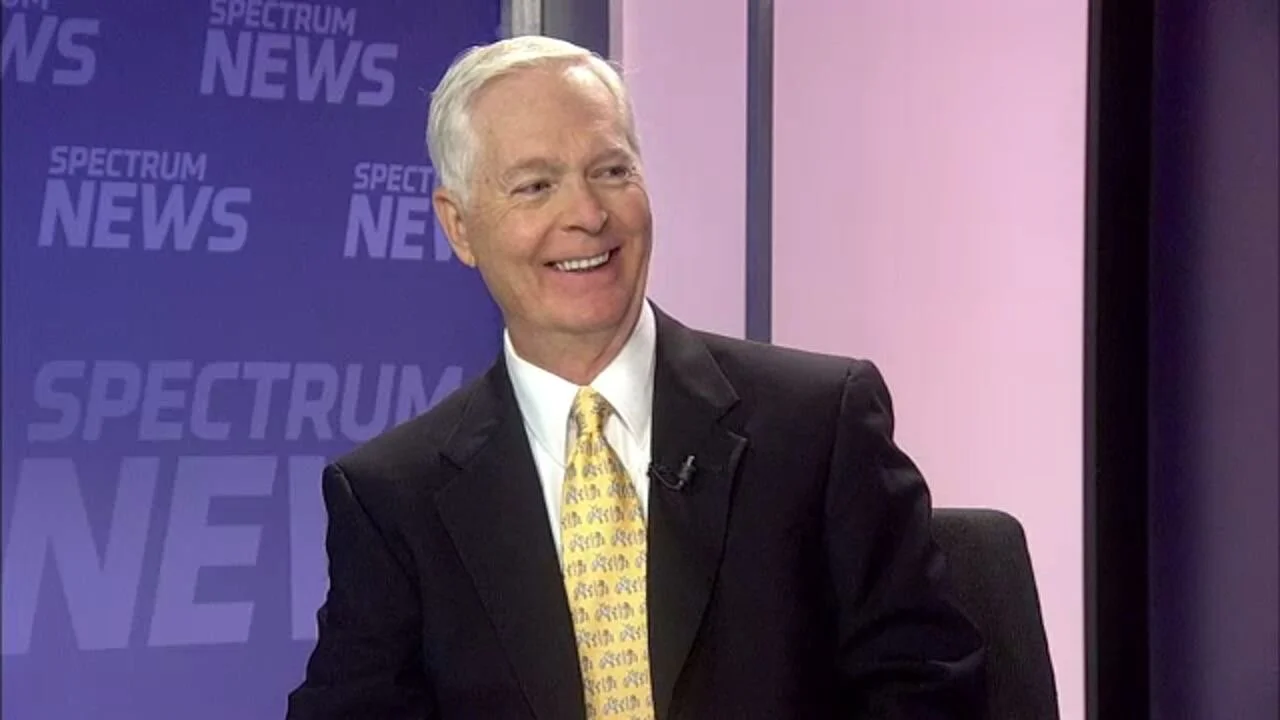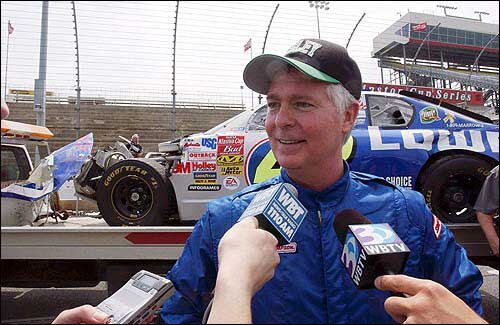
MEET GOVERNOR MIKE EASLEY
Michael Francis "Mike" Easley served as the 72nd governor of North Carolina, from 2001 to 2009. Prior to serving as governor, Easley served eight years as attorney general and 14 years as a local prosecutor, eight as the elected District Attorney.
Easley was born on March 23, 1950. He is married to Mary Pipines Easley. She is a former law professor at North Carolina Central University, worked for ten years as a prosecutor and was in private practice for ten years before becoming a law professor. Mike and Mary have one adult son, Michael Easley, Jr., a practicing attorney.
After leaving public office, Easley continues to promote education reforms and works with business and industry on developing growth strategies and cost-saving business solutions. He also speaks nationally on education, business, and legal matters.
In addition, Easley launched the Easley Law Group which handles plaintiffs work as well as business litigation and business consulting services. He obtained the largest verdict ever awarded in one Western North Carolina county for experimental surgery without patient consent. He has handled major construction case settlements. Most recently Easley has successfully worked with the NCAA to have several student-athlete’s waivers allowed so they remain eligible to play in Division 1 college sports.
In 2018, Easley joined a bipartisan group of former North Carolina Governors to successfully oppose amendments to the state constitution proposed by the General Assembly that would have taken power from the governor and given it to the legislature. In 2019, he again joined a bi-partisan group of former governors to successfully support litigation against unlawful partisan gerrymandering in North Carolina.
Easley guided the state as it transitioned from an agricultural and manufacturing economy to one based on innovation and high skill. As governor, he faced tough choices early in his first term as he coped with the effects of the recession of 2000 due to foreign trade policies that caused the loss of hundreds of thousands of textile, furniture, and other manufacturing jobs. He worked to cut spending while increasing investments in education, proposing a state lottery to boost education improvements and school construction. Easley’s goal was to get worker skills up and costs of doing business down and to build “One North Carolina” where all citizens had access to educational opportunities needed in the new economy. Easley brought to the office a tested record of bringing parties to a consensus, an easy-going personality, and an independent approach to problem-solving.
Easley’s eight years as governor produced an array of accomplishments in public education, job creation and economic development, health care, and the environment.
In 2008, Easley was recognized by the National Education Association as “America’s Greatest Education Governor” for his successful efforts to improve student performance, improve teacher working conditions, and for his signature initiatives, specifically his More at Four pre-k early childhood development effort and Learn and Earn Early College, both of which have been held up as models for use in other states.
In seven of Easley’s eight years as governor, Site Selection magazine named North Carolina as having the #1 business climate in the country. To recruit businesses and good paying jobs to North Carolina, Easley was instrumental in creating the One North Carolina Fund and the Jobs Development Investment Grant program, a unique partnership between government and business.
The second of seven children, Easley was raised a Roman Catholic in otherwise overwhelmingly Protestant Nash County, North Carolina. His father, Alexander Easley, owned a 63-acre farm growing tobacco, cotton and livestock. Easley earned a degree with Honors in political science from the University of North Carolina at Chapel Hill in 1972. While at UNC he was a member of Phi Gamma Delta Fraternity. He then attended the North Carolina Central University School of Law, earning his J.D. degree, with Honors, in 1976 and was managing editor of the Law Review.
Easley is a huge fan of NASCAR, despite being involved in a crash at Lowe's Motor Speedway near Concord, North Carolina, in 2003. He was behind the wheel of Jimmie Johnson's #48 Lowe's Chevrolet Monte Carlo, when it hit a retaining wall going 120 mph after topping out at 173 mph. He was not seriously hurt, since he was wearing a head-and-neck restraint at the time. In fact, after the track was cleared, he took another car out for several laps to prepare it for a race, and two days later he ran 5 hot laps for charity at the All Star race.
Easley is also an avid amateur woodworker, and appeared on an episode of The Woodwright's Shop where he made a walnut table which was auctioned by public TV for $3,400.
Born March 23, 1950 in Rocky Mount, North Carolina
Earned a Bachelor’s Degree in Political Science with Honors from University of North Carolina at Chapel Hill in 1972.
Earned a J.D. with Honors from North Carolina Central University in 1976.
Elected District Attorney serving Brunswick, Columbus, and Bladen Counties in 1982.
Elected 28th Attorney General of North Carolina in 1992. Served from January 9, 1993 to January 6, 2001.
Elected 72nd Governor of North Carolina in 2000. Served from January 6, 2001 to January 10, 2009.
Easley at Lowe’s Motor Speedway in 2003
GOVERNORSHIP
BUILDING A STRONG FOUNDATION FOR ALL OF NORTH CAROLINA’S CHILDREN
PRE-K
Education reform was a centerpiece of Easley's tenure as Governor, to such an extent that in 2008, he received the inaugural "America's Greatest Education Governor" award from the National Education Association. The award was created to showcase "public officials who have demonstrated exemplary achievements and accomplishments in advancing public education." Easley was commended by the NEA for his focus on improving teacher working conditions and for affording teachers a "seat at the table" in discussions surrounding the implementation of education reforms in the state. One of Easley's major initiatives was More at Four, an innovative academic pre-kindergarten for at-risk children.
EARLY COLLEGE
A second signature program advocated by Easley, "Learn and Earn,” enables North Carolina high school students to earn college credit by taking online courses at no cost to them or to their families. This creative program won national acclaim and received the Innovations in American Government Award from Harvard University's Kennedy School of Government.
In presenting the award, Harvard noted that in "2006-2007, rates of grade promotion and graduation for Learn and Earn participants were higher than the statewide average, with nearly half the Learn and Earn high schools seeing 100 percent promotion rates." Harvard also observed that these numbers have not "been skewed by "creaming." The program purposely targets kids at risk, those for whom English is a second language[,] and those who would be first-generation college students."
Research shows that the most successful strategy for student success is cutting class size in the early grades along with quality pre-k. This allows teachers to focus on instruction and gives students more opportunities to concentrate on learning. Towards that end, Governor Easley won funding from the General Assembly to reduce class size in grades K-3 to one teacher for every 18 students.
To solidify the successes in education Easley worked to achieve, keeping North Carolina’s best teachers in the classroom and recruit the finest new classroom instructors was a top priority. During the last five years of his administration, teacher pay increased by 20.2%, bringing average teacher pay up to the national average. Easley also initiated a program to enable North Carolina students to attain a debt-free undergraduate education by receiving EARN Grants of up to $8,000 over two years.
Easley supported a statewide lottery which was approved in 2005. Proceeds from the lottery are used for More at Four and much-needed school construction programs. In 2007, Easley wrote and published a children's book, "Look Out College, Here I Come," the proceeds of which fund a North Carolina education charity.
Growing north carolina’s economy
Increased investments in education and infrastructure were vital to Easley’s economic development strategy, which helped North Carolina successfully attract and retain 21st century industries and jobs. As a result, the state earned numerous accolades as a national leader in economic development, including being ranked as the nation’s top business climate by Site Selection magazine in seven of the eight years Easley was governor. During the Easley administration, thousands of new state economic development projects were announced, resulting in hundreds of thousands of jobs and billions of dollars in investment.
Improving health care
Expanding access to quality health care was also a priority for Easley. In 2001, Governor Easley signed the nation’s strongest patient protection bill of rights into law. North Carolina’s Patient Bill of Rights includes the right to: have prescription drugs covered by your plan if the drugs are medically necessary; choose a pediatrician as your child’s primary care provider; see a doctor for up to 90 days if the doctor is dropped from the network or you are forced to change plans; see a specialist as your primary care doctor if you have a chronic or serious disease; appeal health maintenance organization (HMO) decisions to an independent review panel; hold HMOs accountable in court for their actions; and seek assistance from a citizen ombudsman specially designed to work with patients throughout the review and appeal process. During his two terms, Easley’s efforts expanded health insurance coverage to 124,000 needy children through Health Choice. Easley created North Carolina Rx (NCRx), a prescription drug program, prior to Medicare Part D, that helps low income seniors with prescription costs. The program was funded from tobacco settlement proceeds.
PROTECTING THE ENVIRONMENT
In 2002, Governor Easley led the fight for passage of landmark air quality legislation, the Clean Smokestacks Act, which required power companies to cut emissions by three-fourths over 10 years from coal-fired power plants that cause smog, haze and other pollution problems. In meeting these requirements and taking advantage of Easley-supported cost depreciation credits, the utilities have installed the state's first large-scale scrubbers to remove sulfur dioxide and mercury on coal-fired power plants in Buncombe, Catawba, Person and Stokes counties with more units underway in Brunswick, Gaston, Person and Rutherford counties. The legislation served as a model for other states, and combined with increased vehicle emissions testing and cleaner-burning gasoline and diesel fuel, also yielded important health benefits for citizens of North Carolina by significantly reducing pollution that can trigger asthma and other respiratory problems. In March 2004, the U.S. Environmental Protection Agency presented the state its “Clean Air Award” in recognition of this model legislation. During Easley’s two terms, the state added several major privately-owned natural treasures, including Chimney Rock, Grandfather Mountain, Lake James, Dupont Forest, and Triple Falls, to North Carolina’s system of 34 state parks. In addition, the One North Carolina Naturally initiative, which promotes and coordinates the long-term conservation of North Carolina’s threatened land and water resources, has preserved nearly 590,000 acres of land since its inception in 1999.
VETO
During his administration, Easley was not afraid to confront the state legislature. Easley is the first North Carolina governor to use the power of veto, which voters approved in 1996. In all, Easley used his veto stamp nine times. His first, in 2002, related to legislative efforts to take appointment power from the governor. In 2003, he vetoed a bill that stripped the State Board of Education of its authority to set teacher standards. In 2003, he vetoed legislation which raised fees charged by finance companies. In 2005, he vetoed a bill which would have lowered teacher standards.
CAREER
Mike Easley was elected District Attorney in 1982. His prosecutorial district covered Brunswick, Columbus, and Bladen counties in southeastern North Carolina. He served as president of the Conference of District Attorneys and secured legislation for victim assistance and for drug trafficking investigative grand juries. Easley was named the nation’s top “drugbuster” by USA Today in 1989 for his work prosecuting international drug cartels.
In 1990, Easley ran for the Democratic nomination to challenge incumbent United States Senator Jesse Helms. Easley lost the Democratic primary runoff election to former Charlotte mayor Harvey Gantt, who himself lost to Helms in the general election. Easley campaigned vigorously for Gantt in the general election and the two became good friends. They later collaborated on numerous public policy projects.
Easley was elected North Carolina Attorney General in 1992 and was re-elected in 1996, receiving more votes in both elections than any other statewide candidate. During his tenure as attorney general, Easley was a key leader in negotiating the $206 billion national settlement with the tobacco industry allowing for the creation of the Golden Leaf Foundation, which uses half of the settlement proceeds to fund economic development endeavors in rural North Carolina.
In addition, as attorney general, Easley successfully worked to remove the cap on the state’s prison population, keeping violent felons locked up. He created the first commission on business laws and the economy to promote reform the state’s corporate code and created the business court system, all efforts that led North Carolina to become a more attractive place to do business. He was also a strong advocate for consumers, fighting telemarketers and predatory lenders that targeted senior citizens, and creating the first Citizens Rights Division in the Department of Justice which included victim rights.
In 2000, Easley ran for Governor to succeed the term-limited Jim Hunt. He won the Democratic primary election against incumbent Lieutenant Governor Dennis Wicker, and then successfully challenged Republican Richard Vinroot, the former mayor of Charlotte, in the general election. Easley was reelected in 2004 running against state senator Patrick Ballantine. Though the state voted overwhelmingly for Republicans George W. Bush for president and Richard Burr for United States Senator, Easley won his second term easily, garnering 56% of the vote and helping Democrats reestablish control over both chambers of the state legislature (the House had been split equally between the two major parties since 2003).
Easley was a member of the National Governors Association, the Southern Governors Association, the Democratic Governors Association, the National Association of Attorneys General, and the Democratic Attorneys General Association. Easley’s membership in these organizations provides him with a wide network of relationships throughout nation.
In the National Governors Association, Easley was designated as the lead governor on National Guard issues. He appeared before Congress numerous times to get expanded healthcare and other benefits for Guard troops.


